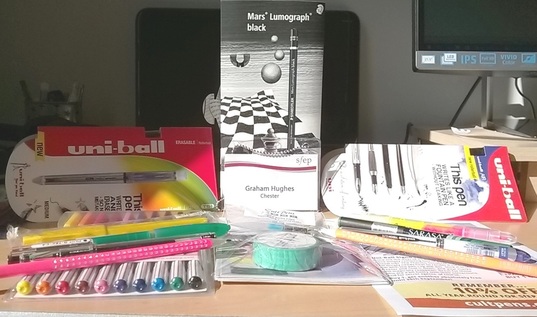|
From 10 to 12 September, I was at Aston University in Birmingham for the 27th annual conference of the Society for Editors and Proofreaders (SfEP).
This was my second SfEP conference, the first being last year’s gathering in York. That time, I arrived with some trepidation, as if I was going to be surrounded by veterans who were out to judge me. I soon realised, though, that this was nonsense. Everyone was there to learn, share ideas and enjoy themselves. This year, I could turn up without any of those worries. The experience that I’d gained in the last 12 months also helped me feel more confident, and being a local group coordinator had possibly even put a slight swagger into my step. Choosing the sessions to attend hadn’t been easy, with some timeslots having at least two that caught my eye. In some cases, it had been a question of whether to pick the one that seemed most interesting or the one that seemed most useful. The venue was superb, with good-quality hotel-style accommodation, and great facilities for the sessions, breaks and meals. Fortunately for the lazier types among us, everything happened in two buildings that were only a few minutes’ walk from each other. Day 1 Although the conference didn’t officially open until late afternoon, there were a couple of pre-conference software sessions available earlier, and I opted for Kathryn Evatt’s ‘Using Google Docs’. After some lengthy technical hitches, it was interesting to learn about the ways in which this web-based software can be used for collaborative writing and editing. Having missed the SfEP AGM last year, I wasn’t sure what to expect from it this time, and braced myself for a possible 90 minutes of tedium. As it turned out, though, it managed to be quite enjoyable. Things really started to get going in the early evening, when quite a crowd gathered in the bar, while the first-timers were treated to a drink with the SfEP council members in the next room. As we moved on to the restaurant for dinner, I inadvertently plonked myself next to the proofreading legend that is Louise Harnby; soon I was gushing to her about how useful her books on business planning and marketing have been. We then stayed at the same tables for a pub-style quiz, ably hosted by conference director Christine Vaughan – a late rally saw our team end up in something like fourth place. Day 2 The main theme of the Sunday sessions, for me, was editing for non-publishers, such as businesses and public-sector bodies. Michelle McFadden and Amanda Picken’s ‘Non-fiction text’ gave some good insight into the main issues involved in working for such clients, and the qualities that they tend to look for in us. Later, in ‘Editing business text’, Sarah Hunter of the Financial Conduct Authority looked at the problems often caused by unclear, verbose wording in informational content, and how we can help to prevent them. Plain-language editing has been on my radar for a while, and this session has jolted me into exploring it sooner than I would have done. During the afternoon, while other attendees were relaxing through an hour-long coffee and tea break, around 15 of us hard-working (cue violins) local group coordinators had a meeting, chaired by Ruth Durbridge, the outgoing regional development director. There was much talk about how to persuade more SfEP members to go along to meetings and other group events (I tried not to look too smug about the fact that our Manchester group has been in danger of having too many people turning up), and about which form of communication to use: the local group’s forum or email (I’m among those who feel the forum is far better, and keep wondering why so many people are reluctant to use it). There was also a humanities-themed ‘Live editing’ session, led by Laura Poole of Copyediting.com, where we edited two short texts and discussed the changes and queries we had come up with. This was one of several ‘live’ sessions, a new idea introduced at this conference. Sunday evening was time for a drinks reception and the all-important gala dinner. The SfEP’s singing troupe, the Linnets, went into rap mode and treated us to ‘Let’s Talk About Text’, based on the Salt-N-Pepa hit ‘Let’s Talk About Sex’. Yes, this did happen. Our after-dinner speaker was American linguist Lynne Murphy, with some funny and thought-provoking observations on differences between UK and US English (a subject that’s often discussed in hackneyed, repetitive style, but not this time). Thought for the evening: which part of your face do you frown with? Most of us then escaped to the bar, rather than run the risk of seeing editors dancing. Day 3 Monday began with the ‘Sense and sensitivity’ session, presented by former SfEP chair Sarah Price, with useful debate on how and when to apply various rules (or ‘rules’?) of grammar and punctuation. Sophie Playle then dished out valuable advice on ‘Making the most of your website’. After lunch, a ‘Speed shake-up’ session hosted by Ruth Durbridge, Ian Howe and Julia Sandford-Cooke gave established editors (mostly much more established than me, I suspect) a raft of ideas about strategic career planning, continuous professional development and expanding (or, if you prefer, ‘getting out of’) your comfort zone. I’m not sure that any SfEP conference can be complete without a talk from our honorary president, the linguistics expert David Crystal. His closing lecture was an entertaining look at how the internet is changing our conception of ‘the text’. After the handing out of raffle prizes and some closing words, it was back into the outside world, walking back to New Street station – a weird experience after two-and-a-bit days in our on-campus editorial bubble. (Who are all these people in the street? Aren’t they editors? If not, why not? etc.) Amazingly, thanks to a train delay that actually worked in my favour at Crewe, I was home just two hours after the close. That evening, even though sleep was beckoning after a demanding few days, my mind was buzzing with thoughts. Back to life Since then, I’ve written up a pile of notes, reread some handouts and made all sorts of follow-up plans – I just hope I manage to put most of them, at least, into action. There’s so much to take away from the conference – every session was of great value. Not only that, but it’s a real pleasure to meet so many like-minded people, catching up with familiar faces from the local groups, the forums and last year’s conference, and meeting new ones. (Though it can be a bit disconcerting to meet someone whose face you only know as a forum avatar. Look – that mouth moves! It makes a sound!) Some people seem to imagine that editors and proofreaders are a stuffy, serious bunch, and that our conferences must be painfully dull. Wrong! Now, I won’t claim that we’re a crazy gang of party animals, but both the conferences I’ve attended have been awash with funny, interesting, friendly people who make for great company. Most of us work alone, and that makes it especially important to get together and share experiences, thoughts and tips. It can be almost overwhelming, though, to suddenly find yourself with about 200 colleagues, and some attendees feel the urge to get away for a quiet breather at times during the conference. We’ve come from all sorts of backgrounds – publishing, journalism, teaching, engineering, IT, you name it – and I think that helps to create a varied mix of approaches and attitudes to our editing and proofreading, as well as helping us to get involved in a wide range of work. It also means there are many different stories about how we ended up here. Here comes my attempt at some sort of interesting thought. This isn’t the kind of work that tends to attract people with big egos. We don’t get much publicity, the pay isn’t spectacular, and there are no glittering awards ceremonies or flash company cars on offer to the high achievers. I think this lack of ego helps to make our conferences so enjoyable – there are no bigheads or bigmouths dominating the show and drowning out the quieter people, and this leaves plenty of space for everyone to have their say. Huge credit is due to the people who helped to make the conference happen: Christine Vaughan, her SfEP council colleagues, the office staff, sponsorship coordinator Sherona Treen-Coward, and the members who volunteered to help out. (Hope I haven’t forgotten anyone?) It ran so smoothly, and every possibility seemed to be catered for. I honestly don’t know how they do it. On to next year During the week leading up to the conference, my heart sank slightly when I noticed that next year’s event will be at an out-of-town venue on the Bedfordshire/Cambridgeshire border – a bit remote for someone up here in the North West without a car. By the time I’d got back, though, I was beginning to dread the thought of missing an SfEP conference; and, especially considering the heroic efforts others have made to get to them, I’m fairly sure I will be there, whatever it takes. Plus, there are some lucky souls who I haven’t really spoken to yet, despite having been at one or even two conferences with them – something needs to be done about that. If you’re an SfEP member and you’re nervous about the idea of going to a conference, please give it a go next year if you can. It’s a safe bet that you will feel at home, enjoy the company, learn a lot, and go away full of ideas and optimism about your work. Honestly, you won’t regret it. Don’t just take my word for it – here’s what some other people think (not forgetting the reactions on Twitter: see #sfep16):
4 Comments
26/9/2016 08:30:11 pm
Great write-up, Graham. 'Who are all these people in the street? Aren’t they editors? If not, why not? etc.' made me laugh! I could relate! Very interesting observations on how our lack of big egos affects the dynamics of the conference, too.
Reply
Graham Hughes
29/9/2016 12:42:40 pm
Thanks, Sophie. I liked your write-up (part 1) as well - I think I'll add a link to it.
Reply
Graham Hughes
13/1/2021 05:22:36 pm
Thanks, Trevor.
Reply
Your comment will be posted after it is approved.
Leave a Reply. |
Thoughts on Words
An editorial blog. Posts by Graham Hughes. Archives
July 2024
Categories |




